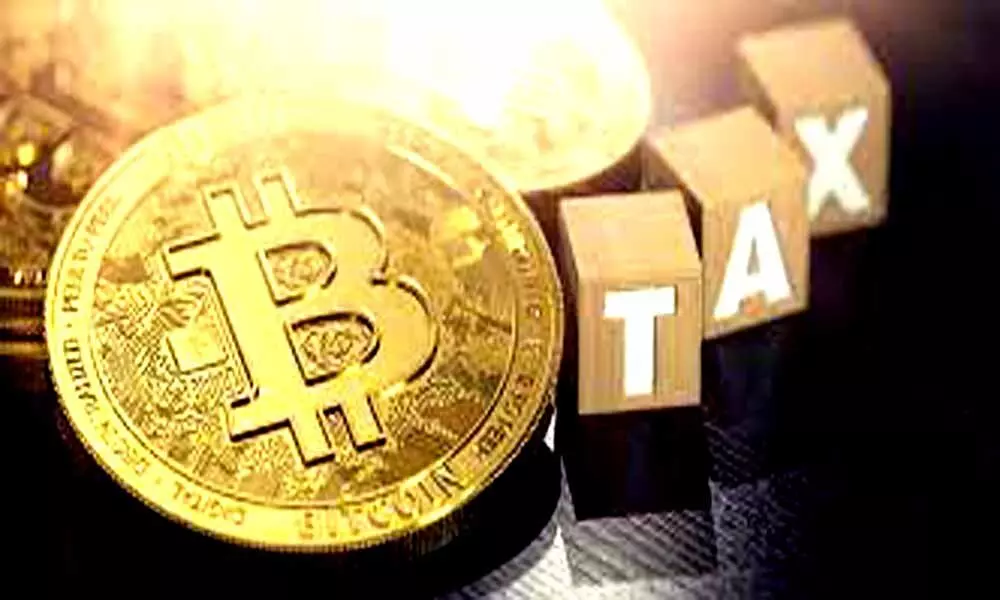Investors in a fix over 30% crypto tax
Voice concerns over provision that doesn’t allow to offset losses arising from one crypto exchange against profits from other virtual digital asset (VDA)
image for illustrative purpose

Tax Tangle
• All loss transactions will be ignored for tax calculation
• Only profit will be calculated
• Mining transaction cost of purchase will be zero
• A higher TDS will drive away investors from KYC-compliant platforms to the grey market
Mumbai: The new regime of flat 30 per cent taxation on income from crypto assets from April 1 will ebb the sentiments for the new age asset class. Bizz Buzz interacted with the industry players to know their views on the latest decision by the Centre.
The government has provided the clarification on the taxation policy for the individuals. Indian investors can't offset the losses arising from one crypto exchange against the profits from others. This means, even if one makes a loss in one asset, one has to pay taxes on the gains on others.
"We hope that the crypto investors will back their investment thesis and stay in with the investment for longer periods," Kunal Jagdale, founder, BitsAir Exchange. On the other hand, Indian exchanges are still awaiting more clarity around GST structure for the crypto assets and we are hopeful that the regulators will soon come up with an investor friendly GST mechanism, he added.
As the new financial year starts from April 1, a new Bill becomes law on virtual crypto assets. As per the Bill, one needs to follow a specific taxation regime for virtual digital asset (VDA).
This includes flat 30 per cent tax on profits without any slab deduction.
The loss in one VDA will not be set off from profit in another VDA. Hence all loss transactions will be ignored for tax calculation and only profit will be calculated. All trading pairs be it fiat to crypto or crypto to crypto will be a taxable event. Apart from holding and trading, even gifting of VDA will be taxable in the hands of the recipients. This tax Bill even covers miners as no expenses of setting up mining are allowed as deduction.
"Therefore, mining transaction cost of purchase will be zero. What can be set off is only the cost of acquisition/purchase on VDA," says Manoj Dalmia, founder, Proaasetz Exchange.
Only profit will be taxed flat 30 per cent without any set off on losses and other cost if mining is included. Only cost of acquisition/purchase on VDA will be considered, he added.
Taxation on crypto assets was clarified in the Union Budget 2022-23. As included in the Union Budget 2022, Minister of Finance Nirmala Sitharaman announced that virtual assets transferred in the digital world will be subject to a 30 per cent tax rate.
Amit Gupta, MD, SAG Infotech, said: "In order to capture transaction details, the minister also stated that government would make the provision for a Tax Deducted at Source (TDS) at the rate of 1 per cent of consideration paid in relation to the transfer of virtual digital assets."
Despite the Finance Bill, the crypto industry sees space for reasonable changes in tax policy.
Crypto assets are to public blockchains, what equities are to public companies. Taxes on crypto should therefore be at par with those in the equity markets.
TDS is to provide a tax trail. A lower TDS can do so without driving users out of KYC-compliant platforms. User protection and tax compliance can co-exist.
"A lower TDS can provide the government with the required tax trail without locking up the users' capital. A higher TDS does not increase tax compliance, instead, it could drive away users from KYC-compliant platforms to the grey market," says Ashish Singhal, co-founder and
CEO, CoinSwitch.
Crypto assets are not independent of the underlying blockchain network. Just like public companies have tradable assets offered to retail investors in the form of equity, public blockchains have tradable assets in the form of crypto assets.
The crypto market is driven by high-frequency traders, like intraday traders in equity markets. These traders operate on extremely thin margins, and locking up their capital with high TDS will restrict their ability to operate.
Further, a flat 30 per cent tax that does not differentiate short-term capital gains from long-term gains, with no provision for deducting expenses incurred or offsetting losses is not in tune with the tax framework for other asset classes and is discriminatory.
The industry has also not yet received the clarifications it had sought on the implementation of tax proposals, and this ambiguity may result in operational obstacles. It is the need of the hour that the government issue these clarifications before the TDS comes into effect on July 1.
A cohesive tax framework, Singhal goes on, would encourage users to diversify their investments across asset classes, thereby promoting financial discipline. To further safeguard users, exchanges and platforms could be subjected to regulatory standards on operations, compliance and security. This will allow the industry to progress and crypto users to continue to benefit from their investments.
Indians have already invested more than $6 billion in cryptos, and prohibitive taxes are likely to unsettle these investors, expose them to possible losses, and possibly drive them out of an industry building the future of the internet in India — for Indians and the world — in pace with the government's mission of Atmanirbhar Bharat.

